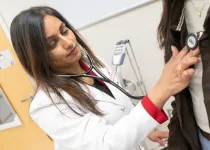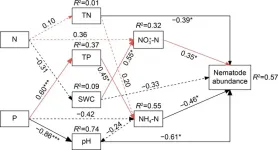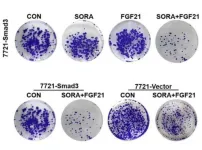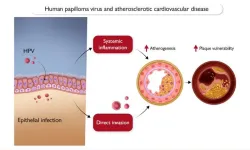(Press-News.org) COLUMBUS, Ohio – Keeping track of blood pressure, cholesterol and blood sugar levels can help identify risk factors for heart disease. However, a national survey by The Ohio State University Wexner Medical Center found that while many adults know their childhood address or best friend’s birthday, less than half know their blood pressure or ideal weight, and fewer than 1 in 5 know their cholesterol or blood sugar levels.
“Recognizing heart disease risk factors early and adequately treating them can potentially prevent heart attacks, strokes and heart failure. As a society, we need to shift from sick care to preventative care so people can live their best and fullest lives possible,” said Laxmi Mehta, MD, director of Preventative Cardiology and Women’s Cardiovascular Health at the Ohio State University Wexner Medical Center and Sarah Ross Soter Endowed Chair in Women’s Cardiovascular Health Research.
The survey asked more than 1,000 adults nationwide if they knew their blood pressure, ideal weight, cholesterol or blood sugar levels. When it came to these key heart health tests, the highest number (44%) knew their ideal weight (body mass index or BMI) and the fewest (15%) knew their blood sugar level. In comparison, 68% knew their childhood address and 58% knew their best friend’s birthday.
“Most people associate diabetes with either their family history or being overweight, and they don’t make the connection that it’s associated with heart disease. People with diabetes are twice as likely to have heart disease or stroke than people without heart disease. And women with diabetes are at a higher risk for heart disease than men,” Mehta said.
While the survey found many Americans don’t know these health numbers off the top of their heads, they are having them regularly checked. The majority said they had their blood pressure and heart rate checked within the last year and blood sugar and cholesterol tests within five years.
“Most people can get screened at their physician’s office or, if they don’t have one, there are free health screening fairs as well as blood pressure machines at pharmacies,” Mehta said. “It’s important to not only know your numbers but be proactive with medication and lifestyle changes like diet and exercise. When you visit your doctor, ask what your numbers are for blood pressure, cholesterol and blood sugar and what a normal range is for you. Discuss your sleep habits along with diet, exercise, smoking and alcohol use. Also, none of us like to talk about our own weight but it’s an important conversation because being overweight is a risk factor for heart disease.”
What are your healthy heart numbers?
Blood pressure. The systolic or top number should be under 120 mm Hg and the diastolic or bottom number should be under 80 mm Hg.
Blood sugar. After fasting for eight hours, blood sugar should be less than 100 mg/dL or a hemoglobin A1C of less than 5.7.
Cholesterol. Talk to your health care professional about what the recommended range of LDL (low-density lipoprotein) cholesterol and triglycerides is for you and how this impacts your heart risk.
Body mass index (BMI). A normal range is between 18.5 and 24.9.
Sleep: Aim for an average of seven to nine hours of sleep a day.
“It’s also important to know your family’s health history and discuss it with your doctor. There could be risk factors that require medication or lifestyle changes and the earlier they’re known, the better. Sometimes people have heart attacks or strokes because their blood pressure or cholesterol levels are really high and they never had them checked,” Mehta said.
A family history of high cholesterol
Erica Hutson, 37, of Plain City was in her 20s when she found out she had high cholesterol through a health check required by insurance. Because she was young and fit, she didn’t do anything about it for 10 years. She changed her mind about it when her father died of coronary artery disease when he was in his 60s and she discovered it ran in the family.
“His death really made me think about things and put my life into a whole different perspective,” she said.
Hutson’s doctor put her on cholesterol medicine but her numbers were still high so she started seeing Wesley Milks, MD, who specializes in lipid disorders at the Ohio State Wexner Medical Center. He added a shot to her statin therapy that is self-injected at home every couple of weeks. Her cholesterol levels are back in the healthy range.
“It’s really important to know what your numbers are, what they mean and consult with your doctor. You need to know what your family history is on both sides so you can give that information to your children and all family members can be prepared to do what it takes to stay healthy,” said Hutson, who has two young children.
Survey Methodology
This study was conducted on behalf of The Ohio State University Wexner Medical Center by SSRS on its Opinion Panel Omnibus platform. The SSRS Opinion Panel Omnibus is a national, twice-per-month, probability-based survey. Data collection was conducted from Dec. 15-17, 2023 among a sample of 1,010 respondents. The survey was conducted via web (n=980) and telephone (n=30) and administered in English. The margin of error for total respondents is +/- 3.7 percentage points at the 95% confidence level. All SSRS Opinion Panel Omnibus data are weighted to represent the target population of U.S. adults ages 18 or older.
###
END
In patients with major depression disorder it is, thanks to use of artificial intelligence, now possible to predict within a week whether an antidepressant will work. With the help of an AI algorithm, a brain scan and an individual's clinical information, researchers from Amsterdam UMC and Radboudumc could see up to 8 weeks faster whether or not the medication would work. The results of this study are published today in the American Journal of Psychiatry.
"This is important news for patients. Normally, ...
As a predator of soil microorganisms, nematodes respond rapidly to changes in soil environment, which can reflect climate conditions, ecosystem succession status, nutrient cycling and soil ecosystem health. In agroecosystems, nitrogen and phosphate fertilizers are often applied in large quantities. Therefore, studying the effect of nitrogen and phosphorus addition on soil nematode communities is helpful to understand how nitrogen and phosphorus addition affects the growth and development of crops in farmland ecosystems. This study demonstrates that the addition of nitrogen and phosphorus significantly ...
This research is led by Donghee Park (Center for Opto-Electronic Materials and Devices, Post-Silicon Semiconductor Institute, Korea Institute of Science and Technology, Republic of Korea) and Dong Ick Son (Institute of Advanced Composite Materials, Korea Institute of Science and Technology; KIST School, Department of Nanomaterials and Nano Science, University of Science and Technology, Republic of Korea)
Recently, many scientists have been developing eco-friendly energy sources to replace fossil fuels to minimize global warming that threatens the global ecosystem. One of the notable studies is photoelectrochemical (PEC) cells that use infinite solar energy as ...
Hepatocellular carcinoma (HCC) is a common disease in human history and one of the main causes of cancer-related death. Sorafenib (SORA) is the best representative of angiogenesis inhibitors and is currently being commonly used in the treatment of advanced HCC as a first-line drug. Although SORA improves the overall survival rate of patients with liver cancer, acquired resistance to SORA has been found in patients with liver cancer and this has led to poor treatment outcomes. Hypoxia is one of the inducements of SORA resistance. Since ...
Women have a four times higher risk of dying from cardiovascular disease if they have an infection with a high-risk strain of the human papillomavirus (HPV), according to research published in the European Heart Journal [1] today (Wednesday).
HPV is a very common infection and high-risk strains are known to cause cervical cancer. Previous research has suggested that HPV may also contribute to the build-up of dangerous plaque in the arteries. However, this is the first study to show a link between high-risk HPV infection and deaths from cardiovascular disease.
The research was led by Professors ...
David Sholl, director of the Transformational Decarbonization Initiative at Oak Ridge National Laboratory, has been elected a member of the National Academy of Engineering for his contributions in addressing large-scale chemical separation challenges, including carbon dioxide capture, using quantitative materials modeling.
Being elected to the National Academy of Engineering is among the highest professional distinction accorded to an engineer. New members are selected by their peers, with this new class bringing total U.S. membership to 2,310. The newly elected class will be formally inducted during ...
HOUSTON – (Feb. 6, 2024) – Rice University chemist James Tour was named to the National Academy of Engineering (NAE), one of the highest professional distinctions accorded “in recognition of distinguished contributions” to the field.
Tour, the T.T. and W.F. Chao Professor, professor of chemistry and of materials science and nanoengineering and of computer science, was recognized for his research on the “synthesis, fabrication, properties, applications and commercialization of novel forms ...
Daily exposure to chemicals used in the manufacture of plastic food containers and many cosmetics may be tied to nearly 56,600 preterm births in the U.S. in 2018, a new study shows. The resulting medical costs, the authors of the report say, were estimated to reach a minimum of $1.6 billion and as much as $8.1 billion over the lifetime of the children.
For decades, the chemicals, called phthalates, have been shown to interfere with the function of certain hormones, or signaling compounds that circulate in the blood and guide much of the body’s processes. Exposure to these toxins, which is believed to occur as consumer products break down and are ingested, has been linked ...
Action is urgently needed to address the dearth of older women in sport and exercise science, not only for the sake of the growing numbers of female athletes, but women’s health in general, urge a group of international researchers in an editorial, published online in the British Journal of Sports Medicine.
There are already far too few sports and exercise science studies that include women, point out the authors, citing their own 2021 report on the sex data gap.
This showed that out of 5261 studies, from across six popular sport and exercise science journals, women and girls made up just over a third of the total number of participants, a figure that is likely ...
Women may find it harder to emotionally adjust to divorce or a relationship break-up in later life than men do, if patterns of antidepressant use are indicative, suggests a large long term study published online in the Journal of Epidemiology & Community Health.
While both sexes increased their antidepressant use in the run up to, and immediate aftermath of, a divorce, break-up, or bereavement, women’s use of these drugs was greater than men’s. And while re-partnering was associated with a slight reduction in antidepressant use in both sexes, it was particularly short-lived in women, the study findings indicate.
Due to population ...








